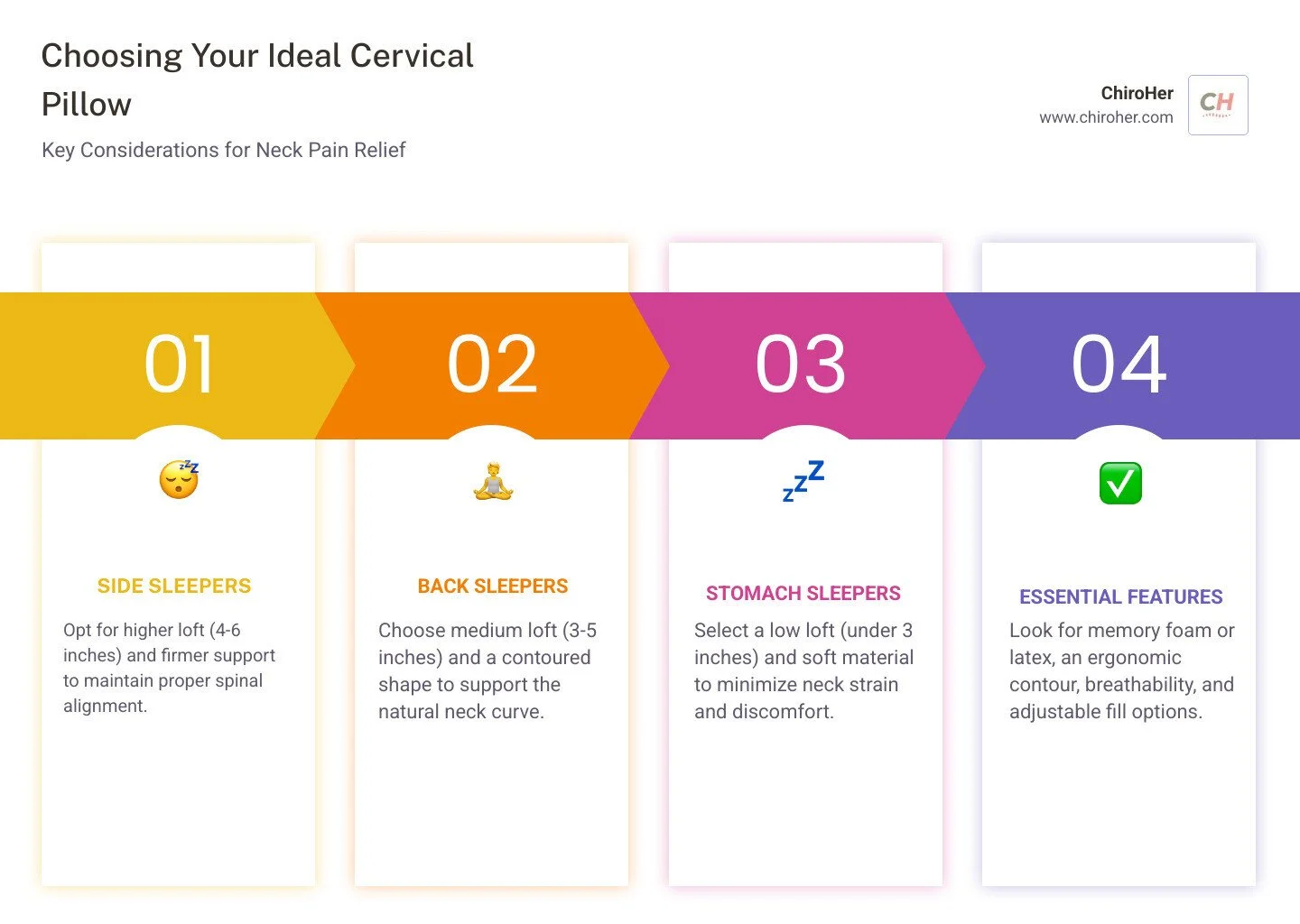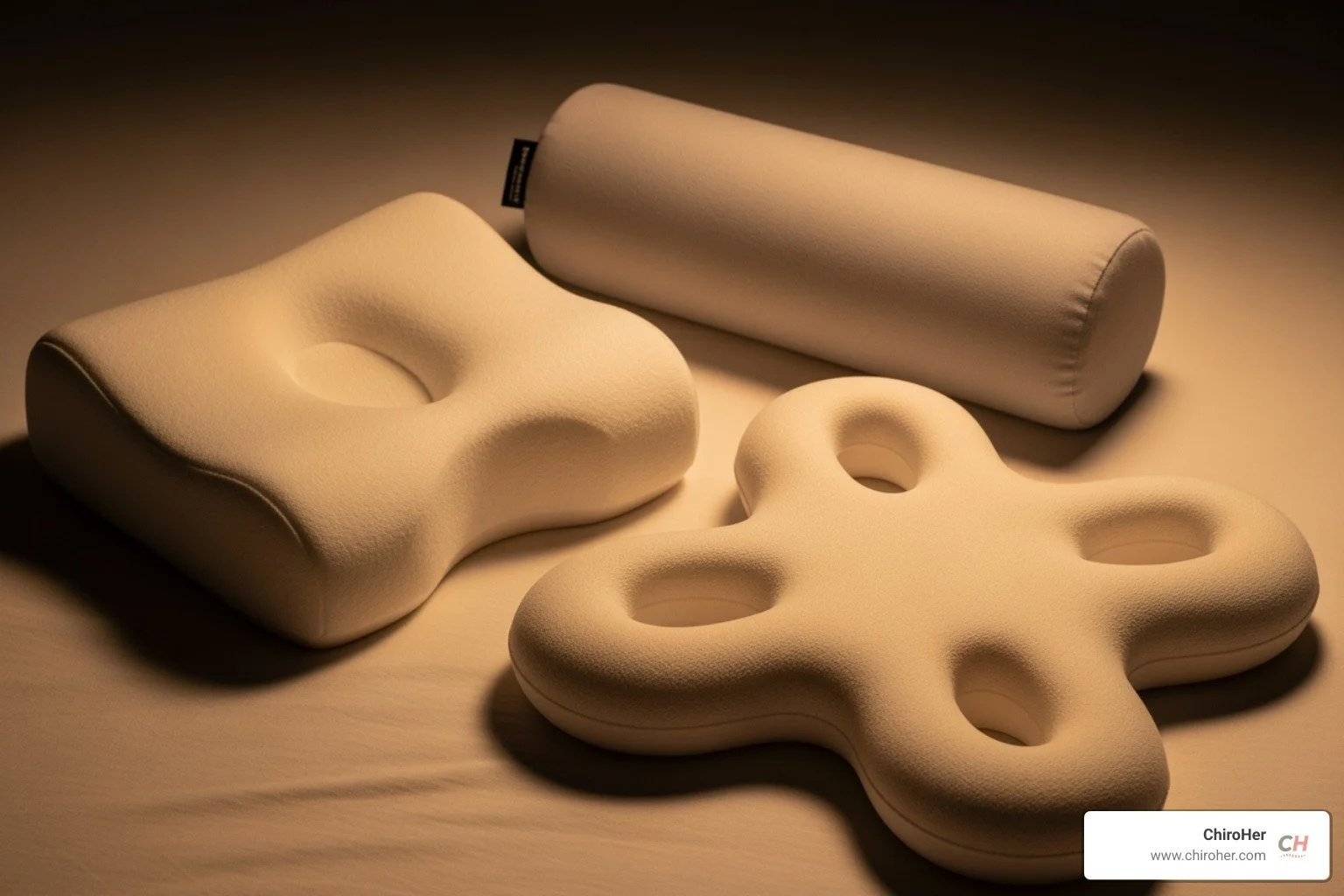Cervical Pillows: Your Secret Weapon Against Neck Pain
Why Proper Neck Support During Sleep Matters
Finding the right cervical pillow for neck pain can mean the difference between waking up refreshed or starting your day with stiffness. Poor sleeping posture and unsupportive pillows are major culprits behind morning neck pain. Your cervical spine has a natural curve that needs proper support throughout the night, which traditional flat pillows often fail to provide.
Here are the top factors to consider:
By Sleeping Position:
Side sleepers: Higher loft (4-6 inches), firmer support
Back sleepers: Medium loft (3-5 inches), contoured shape
Stomach sleepers: Low loft (under 3 inches), soft material
Key Features:
Memory foam or latex for consistent support
Ergonomic contour that matches your neck curve
Breathable materials for temperature regulation
Adjustable fill for customization
Research shows that ergonomic pillows can significantly reduce neck pain by maintaining neutral spine alignment. This keeps your head, neck, and shoulders in the correct relationship while you sleep.
Hi! I'm Dr. Michelle Andrews, founder of ChiroHer in Oklahoma City. I've helped hundreds of patients find relief from neck pain, and I often recommend a cervical pillow as part of a comprehensive treatment approach for both immediate comfort and long-term spinal health.
Understanding Cervical Pillows and Their Role in Neck Health
We've all woken up with a stiff neck, unable to turn our heads without wincing. This morning pain is often your body signaling that your spinal alignment was off during the night. Your cervical spine, or neck, has a natural curve and is more vulnerable to strain than other parts of your spine.
Traditional pillows can be the problem. They might prop your head too high or flatten out, failing to support your neck's natural curve. When your neck is bent awkwardly all night, your muscles and ligaments are strained instead of rested. A cervical pillow for neck pain is designed to address this. Unlike regular pillows, these supports cradle your neck's curve, keeping your head and spine in neutral alignment. Healthcare professionals have recommended cervical pillows for decades, and studies confirm they help prevent neck pain and speed up healing.
What is a Cervical Pillow and How Does it Work?
A cervical pillow is engineered to keep your neck properly aligned while you sleep. Its main job is to maintain the natural curve of your neck, whether you're on your back or your side.
Maintains Alignment: For back sleepers, it supports the neck's curve without tilting the head. For side sleepers, it fills the space between the ear and shoulder, preventing the neck from bending sideways.
Relieves Pressure: By distributing your head's weight evenly, it helps reduce pressure points that can cause tossing and turning.
Promotes Muscle Relaxation: A cervical pillow helps counter the forward head posture from daily activities like looking at phones or computers. This allows strained neck muscles to relax and recover overnight, leading to more restorative sleep.
If you deal with ongoing neck and shoulder discomfort, our comprehensive guide may be helpful: More info about how to relieve neck pain and shoulder pain.
Common Causes of Neck Pain a Pillow Can Address
Your pillow choice can affect many common neck problems. Here are some issues a supportive pillow can help with:
Poor sleeping posture: Stomach sleeping, which forces your head to be turned for hours, is a major cause of strain. Back and side sleepers can also have issues if their pillow fails to provide proper alignment.
Morning stiffness: That stiff neck in the morning is a sign of inflammation from an unnatural neck position during sleep. We explore this in our article about stiff neck pain in the morning.
Tech neck: Constantly looking down at screens creates a forward head posture. An unsupportive pillow at night means your neck never gets a chance to recover.
Degenerative changes: For conditions like cervical spondylosis, proper sleep support is critical. Research shows ergonomic pillows can significantly reduce symptoms.
Muscle strain: Daily stress often leads to tension in the neck and shoulders. A supportive pillow allows these muscles to rest and repair overnight.
How to Choose the Right Cervical Pillow for Neck Pain
Finding the perfect cervical pillow for neck pain is a personal choice that depends on your body and sleeping habits. At ChiroHer, I've seen how the right pillow can be a game-changer for sleep quality and morning comfort.
Your ideal pillow depends on your head's weight, shoulder width, sleeping position, and comfort preferences. Key factors to consider are your sleeping position, pillow material, firmness, loft (height), and shape.
Match the Pillow to Your Sleeping Position for Neck Pain Relief
Your sleeping position determines the type of support your neck needs to stay aligned with your spine.
Side sleepers: You need a pillow with higher loft (4-6 inches) and firmer support to fill the gap between your head and the mattress. This keeps your neck straight, preventing it from bending awkwardly.
Back sleepers: A medium-loft pillow (3-5 inches) works best. It should cradle your neck's natural curve without pushing your head too far forward or letting it drop back.
Stomach sleepers: This position puts the most strain on the neck. If you can't switch to your back or side, use a very low-loft pillow (under 3 inches) or no pillow at all. A soft pillow can help reduce the angle of your neck.
For more specific guidance, see our detailed guide on How to Sleep with Cervical Neck Pain.
Consider Pillow Material and Firmness
The material inside your cervical pillow for neck pain is just as important as its shape.
Memory foam: Molds to your head and neck for customized, firm support. It holds its shape well but can sometimes trap heat. Look for gel-infused or perforated options for better cooling.
Latex: Made from rubber trees, latex is bouncy, responsive, and supportive. It's naturally breathable, durable, and resistant to allergens. According to Dr. Jaspal R. Singh of Weill Cornell Medicine, memory foam and latex create firmer sleeping surfaces. You can learn more about expert opinions on pillow fill types.
Adjustable fill: These pillows contain shredded material that you can add or remove to achieve the perfect height and firmness, offering great customization.
High-quality, durable materials are a worthwhile investment in your sleep health. While firmness is a personal preference, side and back sleepers generally benefit from firmer support, while stomach sleepers need softer options.
Exploring Different Types of Cervical Pillows for Neck Pain
Many designs are available, each serving a specific purpose.
Contour pillows: These have a wave-like shape with a higher curve for neck support and a dip for your head. They are great for back and side sleepers.
Cervical rolls: These cylindrical pillows provide targeted support right under your neck's curve and can be used alone or with your regular pillow.
Adjustable pillows: Allow you to modify the fill to get your ideal height and firmness, which is helpful if you're unsure what you need or change positions at night.
Orthopedic shapes: Come in various forms, like butterflies with shoulder cutouts, designed to target specific problem areas.
Water-based pillows: Contain an adjustable water pouch to control firmness and height. Some studies suggest they offer superior pain relief and sleep quality.
Beyond the Pillow: A Holistic Approach to Neck Pain Relief
While the right cervical pillow for neck pain is a great start, it's part of a larger picture. Lasting relief comes from addressing your daily habits, not just your sleep.
At ChiroHer, I've seen patients achieve the best results when they combine proper sleep support with lifestyle changes. Your pillow provides a foundation for healing at night, but building on it with stretches, ergonomic improvements, and professional care is key.
Complementary Stretches and Lifestyle Adjustments
Simple, consistent changes can make a huge difference in your neck health.
Gentle neck stretches: Slow neck tilts, side bends, and shoulder rolls maintain flexibility and improve blood flow. A few minutes each day can prevent stiffness.
Posture correction: Be mindful of how you hold your body. When sitting or standing, imagine a string gently pulling the top of your head toward the ceiling to counteract forward head posture.
Office ergonomics: Position your computer screen at eye level and use a chair that supports your lower back. Take breaks every hour to get up and move.
Mindful tech use: "Tech neck" from looking down at devices puts tremendous strain on your cervical spine. Take frequent breaks and hold your phone at a higher level.
Hydration and stress management: Staying hydrated helps keep your spinal discs healthy. Managing stress through deep breathing or other techniques can also reduce physical tension in your neck and shoulders.
For more on managing neck pain through chiropractic care, see our guide: Chiropractic for Neck Pain. The National Spine Health Foundation also offers great resources: Expert advice on spine health.
When to Seek Professional Help
A cervical pillow for neck pain and lifestyle changes can provide significant relief, but sometimes professional care is necessary. You should see a healthcare provider if you experience:
Pain that persists for more than a week despite self-care.
Radiating symptoms like pain, numbness, or tingling that travels down your arms.
Severe headaches accompanying your neck pain.
Weakness in your arms or hands.
At ChiroHer, we create personalized plans combining chiropractic adjustments, acupuncture, and therapeutic exercises to address the root cause of your discomfort. We've helped patients throughout Oklahoma City, Yukon, Edmond, and surrounding areas find lasting relief.
Combining a supportive pillow with professional care addresses your pain from all angles. If neck pain is impacting your life, we're here to help.
The content of this article is not intended to be a substitute for professional medical advice, diagnosis, or treatment. Always seek the advice of your physician or other qualified health provider with any questions you may have regarding a medical condition.






